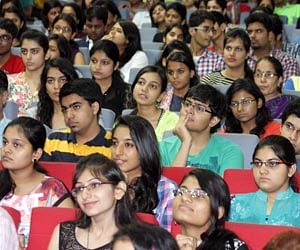
Buoyed by the response to its maiden online admission process this year, Delhi University's School of Open Learning (SOL) is planning to upgrade its teaching methodologies and use "flipped classroom technology" for its personal contact programme.
At SOL, instructions are given primarily through printed course material which is distributed among students. And this is supplemented through personal contact programme at various study centres run by the school.
Following UGC's direction, SOL is planning to minimise the practice of traditional blackboard learning and adopt the "flipped classroom technology" which will also enable the students to attend lectures according to their convenience.
"The online admission process this year has garnered good response from students with more than 50 per cent of the over one lakh applicants choosing to register online.
“We have already started issuing examination admit cards online. However, our teaching methodologies have been the same blackboard learning for decades,” SOL Director C S Dubey said.
"Moreover, the students enrolled with SOL are not able to devote as much time as a regular university student would. They are either working or have other limitations. Hence, the technology will reduce the need for the students to visit their study centres,” he added.
The "flipped classroom" model encompasses use of Internet technology to leverage the learning in classroom, so that the students have access to more interactive classes rather than mundane lectures. It is called the ''flipped class'' because the whole classroom/homework paradigm is "flipped".
What used to be class work (the ''lecture'') is done at home via teacher-created videos and what used to be homework (assigned problems) is now done in class.
"The UGC (University Grants Commission) has also directed SOL to develop its distance education board... Two committees have been constituted to evaluate and suggest measures to upgrade content as well as teaching methodologies," Dubey said.
At SOL, instructions are given primarily through printed course material which is distributed among students. And this is supplemented through personal contact programme at various study centres run by the school.
Following UGC's direction, SOL is planning to minimise the practice of traditional blackboard learning and adopt the "flipped classroom technology" which will also enable the students to attend lectures according to their convenience.
"The online admission process this year has garnered good response from students with more than 50 per cent of the over one lakh applicants choosing to register online.
“We have already started issuing examination admit cards online. However, our teaching methodologies have been the same blackboard learning for decades,” SOL Director C S Dubey said.
"Moreover, the students enrolled with SOL are not able to devote as much time as a regular university student would. They are either working or have other limitations. Hence, the technology will reduce the need for the students to visit their study centres,” he added.
The "flipped classroom" model encompasses use of Internet technology to leverage the learning in classroom, so that the students have access to more interactive classes rather than mundane lectures. It is called the ''flipped class'' because the whole classroom/homework paradigm is "flipped".
What used to be class work (the ''lecture'') is done at home via teacher-created videos and what used to be homework (assigned problems) is now done in class.
"The UGC (University Grants Commission) has also directed SOL to develop its distance education board... Two committees have been constituted to evaluate and suggest measures to upgrade content as well as teaching methodologies," Dubey said.









